Minister of Higher Education, Science and Innovation Dr Blade Nzimande, delivering the 2023/24 budget. Photo: Siyabonga Nxumalo
Government spending on higher education has ballooned, but allocation is key
On Wednesday 24 May, Minister of Higher Education, Science and Innovation Blade Nzimande delivered the keynote address at an event hosted by the National Skills Fund (NSF). Shortly after his address, I interviewed the minister about some of the challenges facing his department and asked some questions ahead of his budget speech later in the afternoon. Three recent graduates were invited to speak on their experiences as NSF bursary recipients. Nzimande’s speech touched on several points, including some milestones for the fund and his department, and served as a precursor to his budget.
The NSF was established in 1999, three years after the formal introduction of the National Student Financial Aid Scheme (NSFAS), after the Skills Development Act was passed in 1998. The Act was introduced to implement national, sector and workplace strategies to develop and improve the skills of the South African workforce, as well as “finance skills development by means of a National Skills Fund”. The NSF is focussed on providing bursaries, scholarships and learnerships in scarce skills and high demand areas. As a result it has come to be intimately connected with the National Development Plan 2030 (NDP).
“There is a universal agreement that a skilled and capable workforce is critical for a country to meet the needs of its citizens,” Nzimande remarked. The NSF bursary covers the full course, including tuition, fees, book allowances, accommodation allowances, travelling allowance, meal allowance and incidental expenses. The budget for student funding has grown by almost 10 fold over the last decade. NSFAS dominates this budget — receiving over a third of the 2022/23 budget — but with the NDP announced in 2012, the NSF’s funding has also grown, considering its focus on high demand areas.
“NSF will be expanded for the provision of scarce skills because clearly there is a big need. The existing student funding model aims to bring together the different components of funding in order to say that every student who deserves to be at a college or a university must get financial assistance — either in the form of a NSFAS bursary or a loan in the case of the missing middle.” The missing middle refers to students who are not financially eligible to receive NSFAS funding but who are also not wealthy enough to privately fund their studies.
In 2021, the minister appointed a ministerial task team to research and develop a new comprehensive student funding model. President Cyril Ramaphosa made specific mention of the new model in this year’s State of the Nation Address, but there have been delays to the process. In his budget speech delivered on 12 May, Nzimande indicated that the task team would present its final report to him by the end of May. In October some of their initial recommendations were announced.
“It has not yet been finalised [yet], and that is what we are working on now. We are presenting it to Cabinet this year. I’m hoping before the end of the year I will be able to announce it.” Though not exclusively for the missing middle, the new comprehensive student funding model will introduce many streamlined reforms into the sector, especially regarding a refined approach to funding.
Nzimande is currently in his second stint as the minister of higher education, assuming the role upon the department’s inception in 2009 and serving until 2018, where he shuffled into the position of minister of transport for two years. He assumed the position of minister of higher education again in 2019. During his first period as minister the sector was upended by #FeesMustFall, which saw students across the country shut down institutions protesting against a lack of access to funding, and in some cases, the insourcing of workers. In Cape Town, students clashed with police on the grounds of parliament.
During his second stint, student protests have changed and lessened in intensity, expanding into accommodation, historical debt and fee blocks.
“Everyone has a right to protest and that is enshrined in our Constitution,” he began, after I asked him about how the most recent student protests differed from the heights of 2015. “You are right in noticing that the protests have not been as intense, because the government has continued to address a lot of the issues that have led to protests in the past. While we still have challenges with student accommodation, last year NSFAS spent R11 billion in one year on student accommodation.”
In conjunction with the national treasury, the department has ameliorated some concerns regarding access to funding, but more money doesn’t equate to efficiency.
Director General Nkosinathi Sishi believes that student protests are misplaced and draw attention away from the young people who need assistance from the department. “We have just over one million university students and when they are protesting, it’s as though there’s a crisis in the sector. But outside of the system we’ve got more than three million young people who are not in education or any form of training or employment, and therefore you can actually see that it’s the protest of the privileged. It’s not the protest of the ones who require our attention,” he said.
Protests persist and accommodation has emerged as a growing concern, especially among university students. “There’s a mix,” Nzimande said in our interview. “There are accommodation buildings owned by universities and colleges and for others we partner with private providers, because the growth in numbers of students in the sector has far outstripped investment in infrastructure. Investment in infrastructure is more costly and it takes longer [than funding tuition].”
The importance of TVET colleges
There is hope that the growing number of technical and vocational education and training (TVET) colleges and students who enrol there will reduce placement and accommodation demands at universities.
In his address at the NSF event, the minister stressed the importance of TVET colleges in the post education and training sector. “We are aggressively positioning the vocational college sub-system as the main platform of delivery for skills development training. We must dispel the perception of colleges as a consolation prize to university entrance and make them institutions of choice,” he said.
When the youth unemployment rate for the first quarter in 2023 was confirmed as 46.5% by Statistics South Africa, labour analyst Michael Bagraim said there is still a severe shortage of skilled artisans such as carpenters, electricians and plumbers. “[Youth unemployment] is getting worse every single quarter and I don’t see an end to it. As long as we’re using the same factors, it’s going to get worse every single quarter and it has been like that for the last 15 years. We need a complete structure to our labour market and education,” he said in an interview with the SABC.
The minister highlighted that in 1994 there was only one national trade test centre in the country, in Olifantsfontein, and celebrated the achievement of the recent accreditation of the 35th national trade test centre. “It’s been realised following the NSF’s R150 million commitment to creating 26 centres of specialisation at our 19 TVET colleges. We’ve designated our colleges to be colleges of excellence, in particular for trades like electricians or welders. They’re funded by the NSF and with that financial support, more than 10 of our TVET colleges have been accredited as trade test centres.”
However NSFAS still does a lot of the heavy lifting and the need to diversify funding has perhaps grown as quickly as the amount of trade test centres. In October last year, the ministerial task team for the comprehensive funding model recommended that the existing ways of funding TVET colleges should be changed so that tuition fees are provided to colleges through a TVET subsidy mechanism, and not through NSFAS.
Attention to high demand trades and scarce artisanal skills is one of the NSF’s priorities. In our interview, I asked the minister to explain how he saw the growing role of TVET colleges in the post education and training sector. He outlined how their enrolment rate should outstrip that of universities by the end of the decade. “In terms of our national development plan it says by 2030 we must have 2.5 million students in TVET colleges and 1.6 million in universities. In other words, we should have almost twice the amount of students in the college sector than the university sector. That’s where the bigger demand is. Out of 100 learners who start grade one, only six reach university. We need to cater to the 94 as well.”
The 94 must be included in skills planning and this sentiment was imbued into the spirit of the morning’s event, showcasing NSF bursary beneficiaries from areas in high demand. In the audience were 82 graduates, some working and others pursuing postgraduate qualifications. There were forensic science graduates from the University of the Free State to mining engineering and actuary graduates from the University of the Witwatersrand. Where NSFAS focuses broadly on funding the post education and training sector, NSF is more specific, though some of its budget is channelled through NSFAS to complement scarce skills funding.
“[The NSF’s] primary focus is on supporting students in scarce skills areas. In the current financial year at least 5 000 students will receive NSF bursaries for undergraduate and postgraduate studies,” Nzimande said in his speech.
To ensure that the skills required are supported by data, the NSF collaborates with the Labour Market Intelligence Program to research supply and demand in the South African labour market, enabling government and businesses to refine their planning for better human resource development. — Nabeel Allie
——————————————————————————————————————–
A word from the beneficiaries
Mighonnie Matthys
Matthys studied at the College of Cape Town’s Wynberg campus, where she completed a hairdressing NQF level 4 qualification. A self-described entrepreneur, she reflected on how her journey began: “The NSF made funding available for unemployed students in 2017. I made up my mind to change my circumstances and live a more meaningful life, and applied for a bursary to study a three-year qualification in hairdressing.”
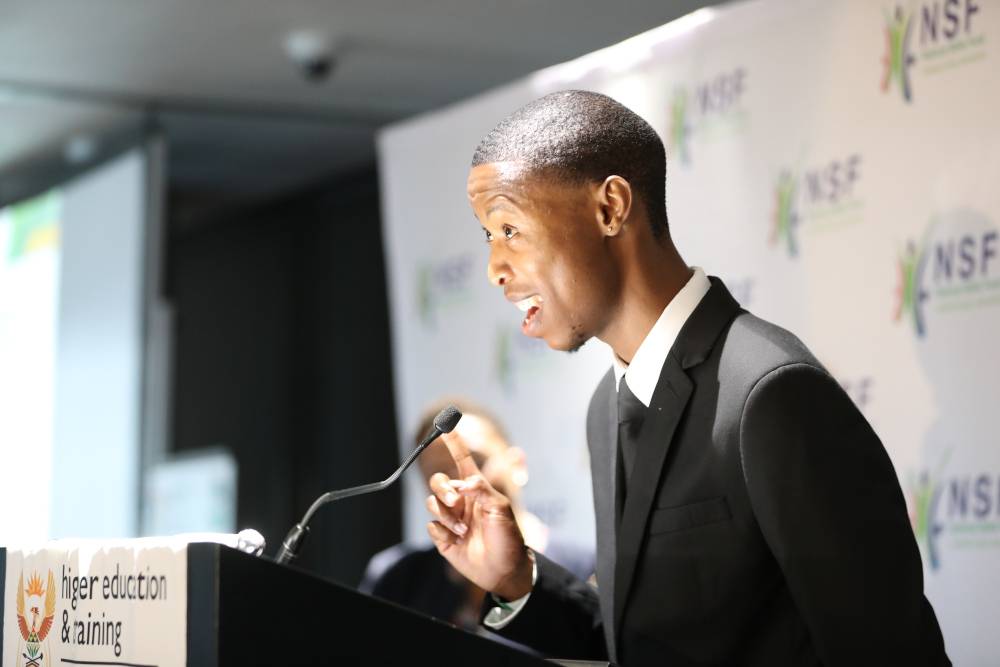 NSF bursary recipient Amandla Dube. (Photo: Khumbelo Naledzani)
NSF bursary recipient Amandla Dube. (Photo: Khumbelo Naledzani)
After completing her studies in 2019, Matthys began working at the Carlton hair salon, where she’s been the manager for the last year-and-a-half. Growing up in an area prone to drug abuse, gangsterism, teenage pregnancy and gender-based violence, hers is a success story hiding in plain sight — cutting hair and leading the salon. “I am not only grateful for having the best higher education and skills training but for learning the values of excellence, perseverance and determination,” she said.
In his budget speech, Dr Blade Nzimande explained that in addition to TVET colleges like the College of Cape Town, the Department of Higher Education has invested in community colleges. They’re adapted from the old system of adult education colleges, which provided literacy for adults who prematurely left the school system. As in Matthys’ story, the community colleges have short skills programmes, specifically for those who want to upskill themselves to find work or start a business.
“If you want to learn baking as a woman aged 40 and you don’t want to do schooling to continue with your formal education, you must be able to go to a community college and be able to acquire those baking skills so that you can sell some cakes and make a living,” Nzimande explained. “The NSF has committed R200 million toward this initiative, which is intended to benefit approximately 3 000 school youths and adults who require different forms of schooling.”
Coupled with university qualifications, it is in artisanal, trade and short skills programmes that the NSF also does much of its work. People like Matthys can be found across South Africa, benefiting from programmes like this. “The NSF has also launched its inaugural funding window that is focussed on building capacity for community colleges. And to continue strengthening the programme of TVET colleges, the NSF has launched the third phase of the public TVET colleges capacity building and occupational programme’s funding window, with a R2.2 billion commitment from the NSF,” the minister said.
Violet Letseku
In 2011 Violet Letseku registered at the University of the Free State for a bachelor of science honours degree in agricultural economics and natural resources. She hails from Ga-Kgapane, just outside Tzaneen. “My dad was the family breadwinner and unfortunately his salary could not afford to take me to university. God came through for my family through NSF,” she remembered.
The journey was not simple. She was initially rejected by the NSF after they explained to her that they were focussing on undergraduate programmes at the time. Because her qualification was an honours programme, they were hesitant to grant her the bursary. “I wrote a motivational letter as to why I wanted them to fund me for an honours degree, and one of the promises I made was that I would complete it with a distinction,” Letseku said — and she did.
“The allowance was more than sufficient for me and I was able to save some money so that my little sister didn’t struggle in her first year of studies. I didn’t want to see my parents’ pain again when it was her turn to go study,” she said.
A candle loses nothing by lighting another candle. Thereafter she completed a graduate programme with Standard Bank and was hired as a credit evaluation manager for small businesses. In 2021, she was promoted to the position of manager of credit evaluation for agriculture and last year she completed her Master’s in Agricultural Economics. She intends to undertake a PhD soon.
Amandla Dube
Where Letseku was set on her area of studies from the start, the same could not be said for Amandla Dube. An actuarial sciences graduate, Dube is from the village of Feni in Mpumalanga. He grew up herding his grandparents’ cows and is now based in Sandton, working for Deloitte. Dube matriculated with seven distinctions and was one of the few from Feni to pursue university studies, enrolling at the University of Pretoria, but due to a lack of funding he deregistered two months into the year and was forced to go back home.
“It wasn’t nice,” he recalled. “You can imagine, going from passing your matric with seven distinctions to now being back in the village. Everyone assumed you’d be out there pursuing your studies, but now you’re back. I had to deal with the shaming and the gossiping. I felt like everyone was talking about me and that I came back, that distinctions mean nothing.”
But it worked out somehow. He had been accepted for actuarial science and engineering, and initially registered for engineering. In the two months that he was there he quickly learned that it wasn’t for him. His enforced gap year gave him more time to understand what he wanted to study. “The next year I registered for actuarial science because I had properly researched it. A lot of people get lost in the change and they have to stick with what they chose,” he explained.
During that gap year he received an unexpected call from the NSF, telling him that he had been approved for funding with an all-expenses bursary. “I was confused,” Dube laughed. “They said they had my information. I wasn’t even interested in where they got my information from. I had to tell them that I deregistered and they were disappointed that I deregistered but they told me it’s fine — because I had been admitted, I could still go back.”
He described his journey as “from Sunlight to Nivea”, returning to Pretoria from Feni to start his studies in actuarial and financial mathematics. He was admitted to continue with the honours programme as one of four black students in a class of 50.
“You [the NSF] did not just change my life, you changed my family’s life and you changed my community as well,” he said. — Nabeel Allie
——————————————————————————————————————–
NSF: What a pleasant surprise
Some NSF beneficiaries I spoke to explained how they received unexpected calls from the NSF after they had registered at their respective universities. They were not aware of NSF or why they were calling. Obakeng Setsome, a forensic science graduate from the University of the Free State, explained that she arrived at campus to begin her undergraduate studies without any funding. “I also didn’t know how I was going to do it and then one fateful day I got a call. I didn’t even know who these people were but after I met them I realised that it was legit.”
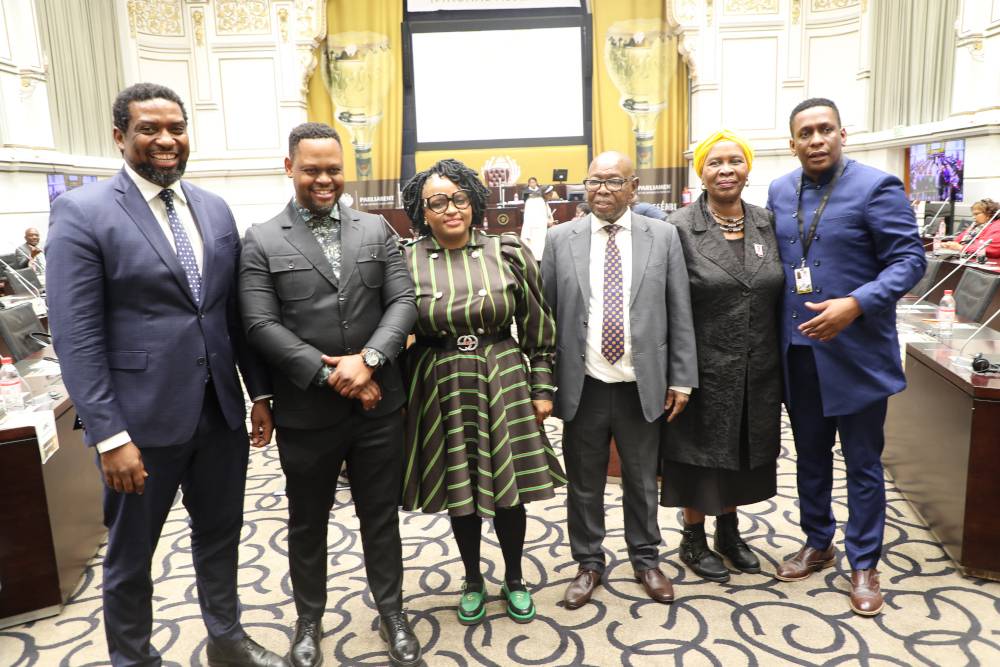 Deputy Minister of Higher Education, Science and Innovation Buti Manamela with members of the Portfolio Committee on Higher Education, Science and Innovation Bafuze Yabo, Jane Mananiso, Duduzile Sibiya and Tebogo Letsi, with Minister of Higher Education, Science and Innovation Dr Blade Nzimande (third from left). (Photo: Siyabonga Nxumalo)
Deputy Minister of Higher Education, Science and Innovation Buti Manamela with members of the Portfolio Committee on Higher Education, Science and Innovation Bafuze Yabo, Jane Mananiso, Duduzile Sibiya and Tebogo Letsi, with Minister of Higher Education, Science and Innovation Dr Blade Nzimande (third from left). (Photo: Siyabonga Nxumalo)
The same was true for Ndumiso Manzi, an electrical engineering graduate from Wits. He feared that a dubious loan was being pushed onto him. “They called me out of the blue. I didn’t apply, they just called. I’d never heard of them, [NSF] was a new thing to me. I didn’t want to sign any contract with them. They kept on calling and I told them I was scared to sign, because if it’s a loan I’m not going to be able to pay it back. They told me it’s not a loan, it’s a bursary, and so I signed. I have no idea how they got my contact details.”
Portia Ngozo explained that her high school principal applied on behalf of the school’s 10 best performing matriculants, of which she was one. She also hadn’t heard of the NSF before and explained that if it hadn’t been for her principal, she wouldn’t have known how to apply or how to get in contact with them.
For Makhosandile Ndabaza, a medical student from Stellenbosch University, the call came halfway through his six-year study programme. His first three years were funded by bursaries from the university and from the Western Cape government. His father, whom he lived alone with, passed away in his third year. At the start of his fourth year he received a call from the NSF.
“I’d never heard of them. But I was in fourth year and things were going South and that’s when I got the funding. That alleviated my financial stress and I could focus on my academics. It was a lot better compared to the bursaries I had from first to third year. They routinely check up on you. I really appreciated that. They also take feedback. Even though sometimes there were delays, having someone say, ‘this is what’s happening’, gives you peace of mind.”
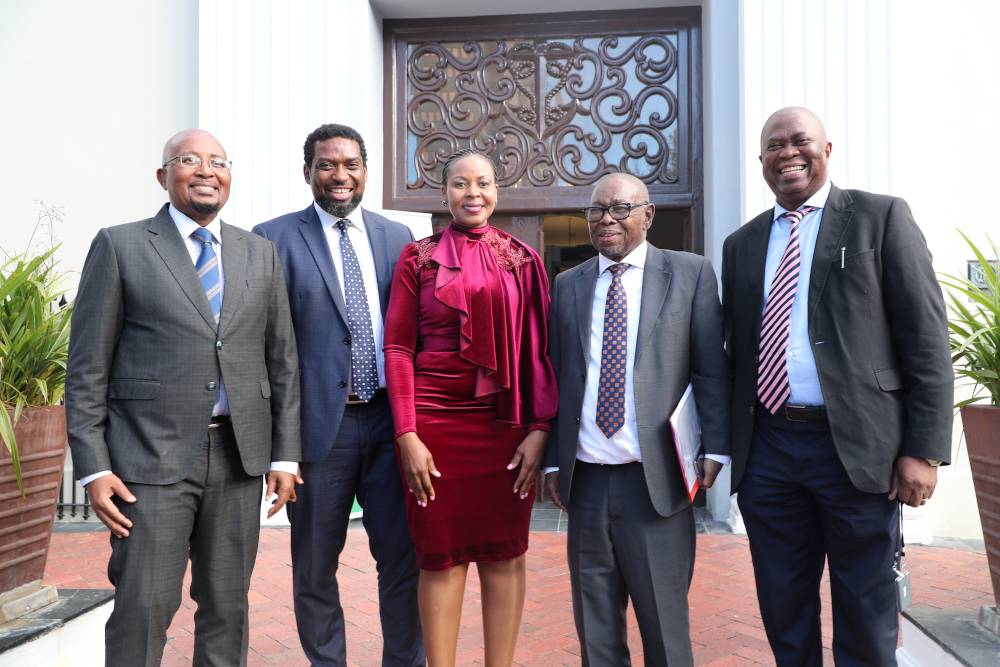 Dr Nkosinathi Sishi, Buti Manamela, CFO Pretty Makukule, Dr Blade Nzimande and Dr Phil Mjwara from the Ministry of Higher Education, Science and Innovation. (Photo: Siyabonga Nxumalo)
Dr Nkosinathi Sishi, Buti Manamela, CFO Pretty Makukule, Dr Blade Nzimande and Dr Phil Mjwara from the Ministry of Higher Education, Science and Innovation. (Photo: Siyabonga Nxumalo)
The routine checkups were an inconsistent theme between bursary recipients. Students from the University of the Free State and Stellenbosch explained that they received mentoring and visits every quarter or semester, whereas the students from Wits explained that they didn’t share this experience. Setsome detailed how mentors would visit her once a semester to check on her progress, mental health and physical health, and that NSF representatives did avail themselves by encouraging bursary recipients to reach out if they needed anything.
Setsome is currently reading towards her Master’s in Forensic Sciences at Rhodes University and is doing so with a private bursary. She believes that the NSF prepared her to thrive under the conditions of a private bursary with an old-fashioned two-pronged funding approach: tuition coverage and a lump sum payment. “NSF doesn’t just fund you financially. The monitoring visits are really useful to see how we’re coping in a new environment and settling in from high school.”
The support she received enabled her to be more self-sufficient at Rhodes, making the transition easier, as she grew up in Gauteng, completed her undergraduate in the Free State and now doing her MA in the Eastern Cape.
Ndabaza believes that the department should modernise its everyday operations for student-facing programmes and schemes, like NSFAS, NSF and accommodation. Though he didn’t share the mentoring experiences enjoyed by bursary recipients at UFS, he believes the department should invest in apps and digital technology when engaging with students, from micro interactions like with Setsome’s mentor to macro engagements like applying for funding.
“There are often long queues of students wanting to get to the NSFAS offices to try and sort out their funding. And I think a reason for this is because it’s still mostly paper-based.” As a result, he and a partner have worked on an app called Platogram, which centralises and digitises the funding process. “We’re in the 21st century,” he affirmed.
— Nabeel Allie
——————————————————————————————————————–
The 2023/24 DHET Budget Speech reviewed
Minister of Higher Education, Science and Innovation Blade Nzimande’s budget was delivered a few hours after I spoke with him and some of the NSF beneficiaries. In it he spoke about the expansion of community and TVET colleges, as well as construction projects the department is undertaking, including two new universities, the University of Science and Innovation in Ekurhuleni and the Crime Detection University in Hammanskraal.
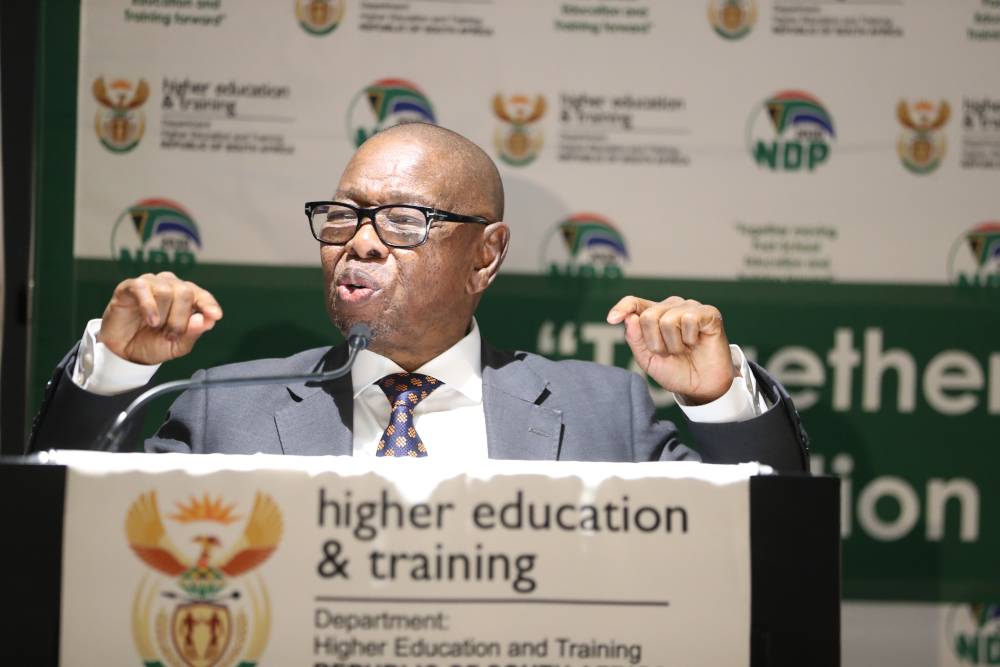 Minister of Higher Education, Science and Innovation Dr Blade Nzimande addressing the NSF event. (Photo: Khumbelo Naledzani)
Minister of Higher Education, Science and Innovation Dr Blade Nzimande addressing the NSF event. (Photo: Khumbelo Naledzani)
Though diverse in its topics, Nzimande’s iridescent budget speech last year was still coloured by some of the last remnants of Covid-19 and the related economic recovery plans. The theme that came through in this year’s speech was growth.
In his budget speech, Nzimande announced a budget of R133.8 billion, with a National Student Financial Aid Scheme (NSFAS) allocation of R47.6 billion. He celebrated the milestone of funding one million students and indicated that of that number, half are South African Social Security Agency (SASSA) grant beneficiaries. The growth of higher education and student funding is immense when seen in historical context. When the Tertiary Education Fund of South Africa (TEFSA), the precursor to NSFAS, was introduced in 1991 it funded roughly 7 000 students with a budget of just over R21 million — approximately R135 million when adjusted for inflation.
Today, the University of Cape Town has over 6 000 undergraduate students in its humanities faculty alone. The 2023/24 budget is over 2 000 times as big as the 1991 budget. Considering the last two budgets, we can see a steady increase in the total NSFAS allocation. The total 2021/22 budget was R115 billion, with R41.5 billion given to NSFAS. In 2022/23, the total budget was R130 billion with R49 billion set aside for NSFAS. This year the minister allocated NSFAS R47.6 billion. The NSFAS portion of the total budget over the last three years, including this year, is well over a third.
With such an explosion in the scale of student funding, South Africans cannot be blamed for becoming cynical about every billion mentioned. In our interview, I raised these figures with Nzimande and asked whether he was sure the budget wasn’t being spent wastefully. “The money is being used wisely. It doesn’t mean we don’t have problems or challenges, but as I’m talking to you here now, all the NSFAS beneficiaries have received their money and they are studying.”
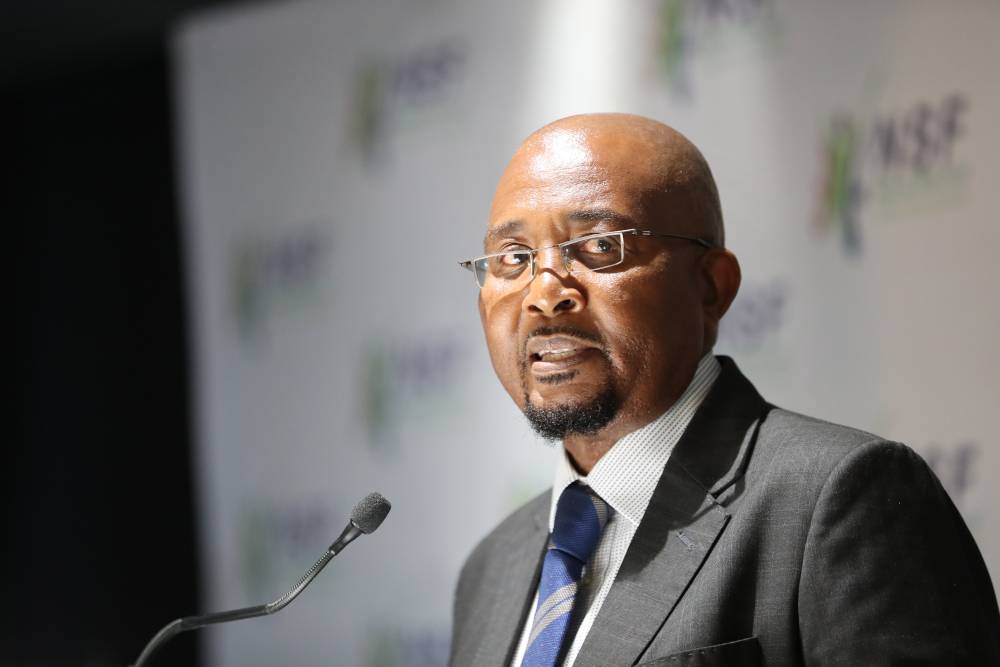 Director-General of the Department of Higher Education and Training Dr Nkosinathi Sishi. (Photo: Khumbelo Naledzani)
Director-General of the Department of Higher Education and Training Dr Nkosinathi Sishi. (Photo: Khumbelo Naledzani)
One of the most recent changes to student funding has been the shift away from loans. The minutes of a 1999 education portfolio committee meeting about NSFAS read: “Loan recovery is most important, because money can be recycled, and the National Student Financial Aid Scheme Bill allows for this recovery, now enabling employers to deduct from salaries.”
A hole in the department’s budget
But students who enrolled with NSFAS from 2019 onwards, provided that they pass their courses and graduate, don’t have to pay back a cent. It’s free education in our lifetime. Detractors argue that this implicitly makes NSFAS an ever-growing hole in the department’s budget, giving money away with little tangible takeaways to celebrate other than increased annual funding. Supporters counter that it is a long-term investment in the future of this country and the benefits of a skilled and educated population will bear fruit in time.
On the theme of growth, there was significant attention paid to TVET and community colleges as well as learnerships and artisanal programmes. “The time has arrived for us to drastically increase intake in TVET and community colleges,” the minister said from the podium. He announced the target of enrolling one million students in community colleges and two million in public and private TVET colleges. “Ideally, no TVET college graduate who requires work placement must not get it. There are enough workplaces in this country and enough money to be able to place these students, so that we make TVET colleges [our] colleges of choice,” he said.
Nzimande went on to explain how he wanted colleges to engage in entrepreneurial training, emphasising the importance of both work placement and enabling graduates to create work for themselves. “Currently 26 of [our 50 TVET] colleges are engaged in entrepreneurial training through our entrepreneurship hubs. We are working to ensure that all our colleges are involved in some form of entrepreneurship training in the next three years.”
On the need to digitise the department of higher education’s ways of working, the uptake in TVET college’s use of technology was highlighted. “We have witnessed student growth in several TVET colleges that have now begun to embrace the use of technology in their enrolment processes and reducing the number of walk-ins.” Mention was also made regarding the introduction of using WhatsApp and Unstructured Supplementary Service Data (USSD) to assist students in tracking their 2023 applications and receiving direct responses to reduce the reliance on the NSFAS call centre. In using these two means, NSFAS is attempting to build digital connectivity with students from the ground up, using accessible cellphone functionality rather than having to tackle the potential issues around digital literacy and access that may emerge with apps.
On the topical issue of student accommodation, a concern over which students protested at a number of universities this year, it was announced that NSFAS has opened applications for accommodation providers to apply for accreditation in the Eastern Cape, Gauteng and KwaZulu-Natal. This came in light of NSFAS chairperson Ernest Khosa’s comments in April this year, explaining how the Special Investigating Unit had found “mafias” operating in the student accommodation sector.
In line with his focus on training and short skills programmes, Nzimande announced the department’s first investment into community college learning centre infrastructure. Construction for three community college centres will begin this financial year, with the minister looking to transition away from adult basic education and night schools. This bears some resemblance to how further education and training (FET) colleges transitioned into TVET colleges. In conjunction with community colleges, he hopes they will help bridge the gap from qualifying to work placement.
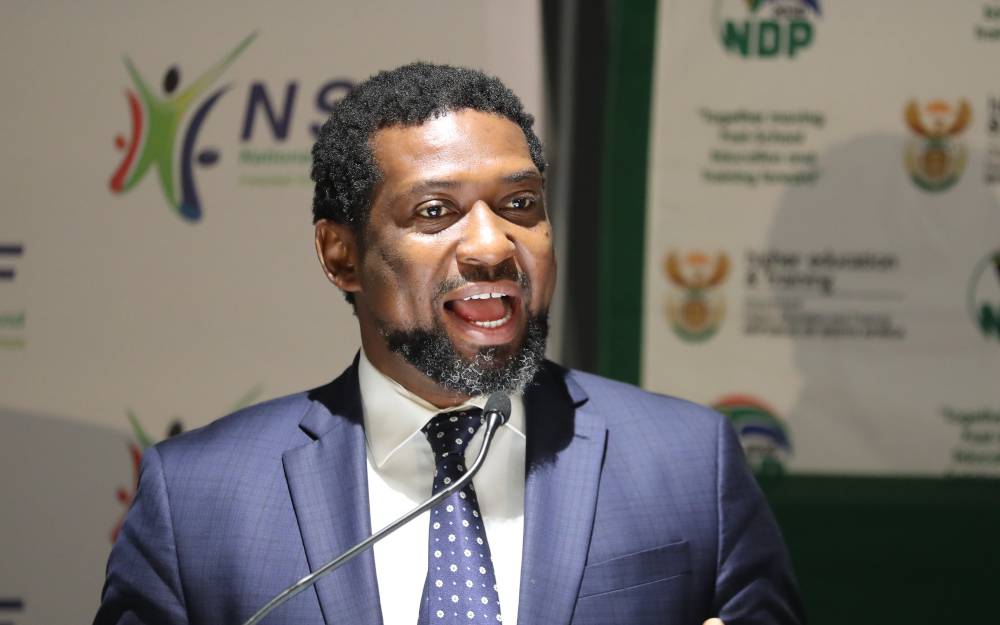 Deputy Minister of Higher Education, Science and Innovation Buti Manamela. (Photo: Khumbelo Naledzani)
Deputy Minister of Higher Education, Science and Innovation Buti Manamela. (Photo: Khumbelo Naledzani)
He spoke to this point at the morning’s NSF breakfast, saying: “I’ve said before if you are a TVET college that doesn’t have industry or workplaces to link up with, you are not a TVET college, you are an FET college. And we buried FET colleges the day this department of higher education and training was established in 2009.”
For this financial year, the department of higher education is targeting 110 500 workplace-based learning opportunities and 149 000 registrations in skills development programs, and 21 000 new artisanal trade graduates.
Furthermore, he announced the completion of feasibility studies for the establishment of two new universities in Gauteng, the University of Science and Innovation in Ekurhuleni and the Crime Detection University in Hammanskraal. Nzimande said construction should begin next year. They will be the third and fourth public universities built in the democratic era after doors were opened at the University of Mpumalanga and Sol Plaatje University in 2013 and 2014 respectively. The minister also announced that the construction design phase for the University of Zululand’s new Ulundi campus had begun.
It would be an overstatement to declare the parliamentary space as one of rich debate and engagement. It followed a familiar pattern: the ANC lauding its own work and both them and the opposition throwing cheap verbal attacks at each other, and opposition parties targeting the ruling party’s wasteful expenditure and history of corruption.
A salient point raised by the EFF’s Naledi Chirwa was that it is a failure that the Department of Higher Education doesn’t absorb all matriculants into its structures. She also emphasised the point that universities especially should be focussing on skills development to ready the country for the fourth industrial revolution. There was a noticeable contrast in her sentiment and the minister’s increased focus on trade and artisanal skills. The unemployment rate has consistently hovered at around a third of the population, and the impact thereof is particularly painful on young people. Statistics South Africa indicated that in the first quarter of this year, the youth unemployment rate had jumped to 46.5%.
The last 30 years have seen a boom in graduates as well as youth unemployment, which the department of higher education is more connected to than general unemployment. “There are 200 000 graduates from last year sitting at home,” Chirwa chided Nzimande.
Though the growth in funding and enrollment since 1991 is admirable, the transition from qualification to work is severely lacking. The legacy of the department and its minister cannot be a shimmering showcase of funding — it must endeavour to translate that into employment.
There is a universal agreement that a skilled and capable workforce is critical for a country to meet the needs of its citizens. We will soon see if the people of South Africa afford Nzimande the opportunity to transition this latent group of graduates from qualified to employed, or whether new leaders will be elected to get the job done.
— Nabeel Allie